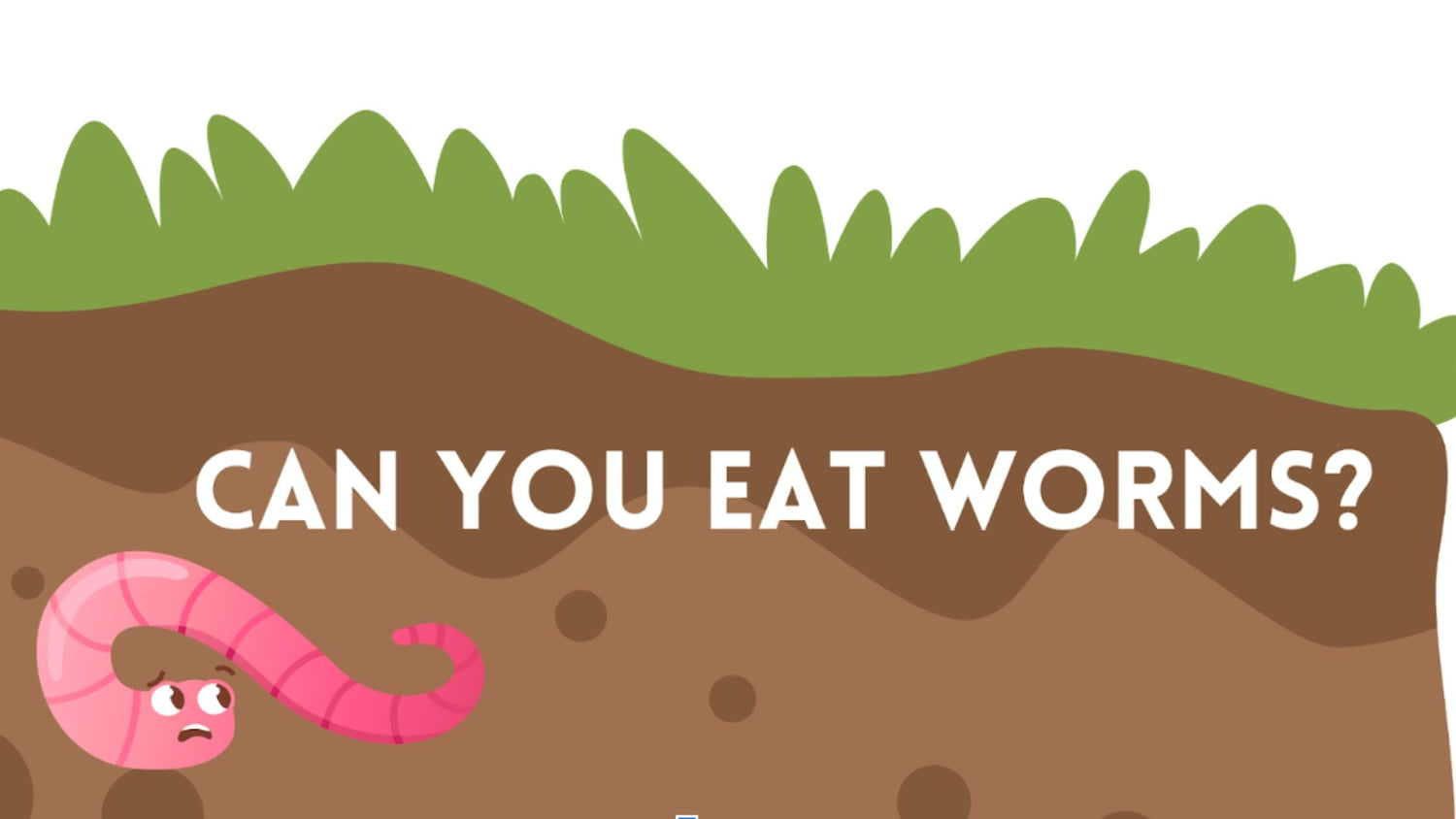Yes — technically you can eat worms, and many cultures eat insects and larvae as nutritious food. But there are real safety considerations: wild earthworms, maggots, and parasites can carry bacteria, parasites, or toxins. Proper sourcing, preparation (cleaning/cooking), or buying from approved edible-insect suppliers makes the difference between a safe protein and a stomach (or worse) emergency.
Why do people ask “can you eat worms?”
Worms show up in media, survival stories, and backyard bins. Some people wonder whether the little wrigglers found in soil, compost, or accidentally in fruit are edible — and whether swallowing them might make you sick or give you parasites. Others are curious because edible insects are trending as sustainable protein.
What “worms” are we talking about?

Commonly confused groups:
- Earthworms (annelids) — the familiar composting worms (e.g., Eisenia fetida). People sometimes eat them in survival situations or as novelty.
- Tapeworms (cestodes) — parasitic flatworms that live inside hosts; never a food source. “Can you eat a tapeworm?” — you might ingest one accidentally via infected raw fish, but you shouldn’t eat a tapeworm as food.
- Maggots and fly larvae — commonly found in spoiled food; eating them often raises the risk of bacterial poisoning.
- Parasitic nematodes (Anisakis, Trichinella, etc.) — associated with raw fish and undercooked meat; relevant for sushi and wild fish.
Are worms nutritious?
Yes. Many worms and insect larvae are high in protein, healthy fats, iron, and zinc. Reviews on edible insects show strong macro- and micronutrient content, and earthworm meal can be a good protein source for feed or processed foods when properly prepared. That’s why interest in insect protein (including certain larvae) is growing globally. But note: nutritional value depends on species, diet, and processing.
Must Read : How to Keep Worms Alive
What are the risks of eating worms?
Key concerns:
-
Bacterial contamination — wild worms live in soil and compost that may carry pathogenic bacteria; eating raw worms or maggot-infested food can cause bacterial food poisoning.
-
Parasites — while most earthworms themselves do not transmit common human intestinal worms directly, parasites associated with raw fish (e.g., anisakid nematodes, fish tapeworms) can infect humans if fish is raw/undercooked or improperly frozen.
-
Toxins and heavy metals — worms can bioaccumulate contaminants from soil (pesticides, heavy metals). Wild-caught worms from unknown locations may therefore pose chemical risks.
- Allergic reactions — proteins from some parasites or insects can trigger allergies even after the parasite is dead.
Bottom line: Proper sourcing, cleaning, and cooking drastically reduce most risks. For raw consumption (e.g., survival), the risk is higher.

Are earthworms edible? What about eating earthworms alive?
- Edible if processed correctly. Studies show earthworm meals can be microbiologically safe after proper processing (raising, purging, and cooking). But raw earthworms from the yard are risky due to soil bacteria and contaminants.
- Eating them alive is not recommended. Live consumption increases risk of ingesting parasites, soil pathogens, and gastroliths. Traditional preparation (wash/purge, blanch/boil, dry/fry) is far safer.
If you want to try edible worms safely
-
Buy from a reliable source. Use suppliers that raise insects/worms for human consumption (food-grade) rather than grabbing backyard worms. This reduces contamination and chemical risks.
-
Purge/clean: Feed the worms clean food (e.g., cornmeal) or purge them in clean water so their gut contents are cleared before processing. This is common advice in vermiculture and survival guides.
-
Cook thoroughly: Heat kills bacteria, parasites, and many toxins. Frying, boiling, or drying to make worm powder or flour is standard.
-
Avoid wild-caught worms from contaminated sites: Don’t collect worms near chemical sites, busy roads, or contaminated gardens. They can bioaccumulate heavy metals and pesticides.
- Allergy caution: If you’re allergic to shellfish or dust mites you may also react to insect/arthropod proteins. Start with a small amount and watch for symptoms.
When to see a doctor?
If you suspect you swallowed contaminated worms or you have persistent abdominal pain, diarrhea, vomiting, unexplained weight loss, or notice segments/worms in stool, see a healthcare provider. Parasitic infections are usually treatable with prescription antiparasitics, but they’re best diagnosed early.
Must Read : Best Worms For Fishing
Specific myths
- Can eating a worm kill you? Extremely unlikely from a single incident if you’re otherwise healthy, but serious infections or bacterial poisoning can happen in rare cases — especially if the organism was contaminated or you’re immunocompromised. Don’t eat unknown wild worms raw.
- Can eating paper give you worms? No. Eating paper (a form of pica) won’t “give you worms.” It can cause digestive blockage or other issues, but it does not introduce parasitic worms.
- Can sugar give you worms? No — sugar does not cause worm infestations. Worm infections come from ingesting worm eggs/larvae (often via contaminated food, water, or soil), not from sweets.
- Can you get worms from eating raw cookie dough? Not worms — but raw cookie dough can cause bacterial infections (salmonella from raw eggs, E. coli from raw flour). So it can make you sick, just not with parasitic worms.
Sources & references
- Healthline — Eating Worms: Nutrients, Safety, and More. Healthline
- CDC — Anisakiasis / parasite guidance for raw fish; freezing recommendations. CDC
- FDA — Fish and Fishery Products Hazards and Controls Guidance (parasite destruction & freezing). U.S. Food and Drug Administration
- PubMed / NCBI — Edible earthworms: food safety perspective (Conti et al., 2019). PMC
- Peer-reviewed review — Edible insects as nutrition (PMC review). PMC
- Cleveland Clinic — Intestinal parasites & worms overview. Cleveland Clinic
- Health & news stories on sushi/tapeworm case studies (Time / The Guardian).




Leave a comment
All comments are moderated before being published.
This site is protected by hCaptcha and the hCaptcha Privacy Policy and Terms of Service apply.